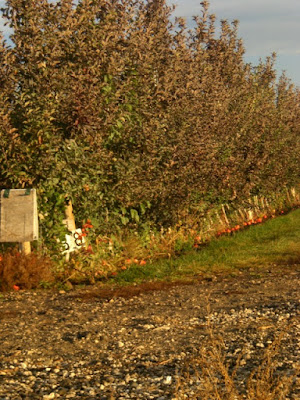This photo bothers me! Taken in a farming area about thirty
miles from our home, it shows how the quest for the “perfect” (and prime-market-price)
apple means that apples that don’t measure up are simply dropped to the ground
to rot. Such waste! You have to understand that my husband and I
absorbed the Depression-era thriftiness of our parents. Gleaning goes along with habits like
fixing-up, shopping sales, couponing, checking
second-hand sources (thrift stores, want ads, yard sales), and making-do with less.
I thought of all the applesauce those rejected apples could
make! Or apple desserts. Apple juice.
Apple leather. But complete use
of food resources doesn’t happen.
Could there be a spiritual lesson here? I quickly rejected the idea that God only
takes the cream of the crop, so to say, to join Him in Heaven. Two verses verify His desire for us, His
created beings:
This is good and
acceptable in the sight of God our Savior, who desires all men to be saved and
to come to the knowledge of the truth (1 Tim. 2:3-4).
The Lord is not slow
about His promise, as some count slowness, but is patient toward you, not
wishing for any to perish but for all to come to repentance (2 Pet. 3:9).
Unlike those “prime-pickers,” God doesn’t look for perfection
to in order to bring us into His family. As Jesus hung in agony on the cross, He accepted the
confession of a filthy, miserable thief who hung on the cross next to Him. He encountered an immoral woman at a
Samaritan well and offered her Living Water, Himself, which she eagerly
accepted. But, Jesus had harsh words for the Pharisees, who counted on pedigree
and keeping long lists of religious rules for so-called favor with God.
I’m sorry, but I have a hard time with people who claim, “I
prayed the salvation prayer in Miss Percival’s first grade Sunday school,” but
they aren't living out that faith. Twenty-some or more years later they’re like apple saplings that withered up
and never produced fruit. The apostle
Paul explained the need of true change, too:
At one time we too were foolish, disobedient,
deceived, and enslaved by all kinds of passions and pleasures. We lived in malice and envy, being hated and
hating one another. But when the kindness and love of God our Savior appeared,
he saved us, not because of righteous things we have done [remember the phony
faith of the Pharisees!] but because of his mercy.(Titus 3:3-5a,comment added)
What does this look like in real life? Paul’s list (Titus
3:1-2) included:
*Subject to rulers and authorities
*Obedient*Ready to do whatever is good
*Slandering no one
*Peaceable and considerate
*Showing true humility toward men (and women)
If such qualities were apples, they’d go in the “prime
market” picking bag right away!
P.S. Need another standard for prime-market spiritual
fruit? Try Colossians 1:10-12.



